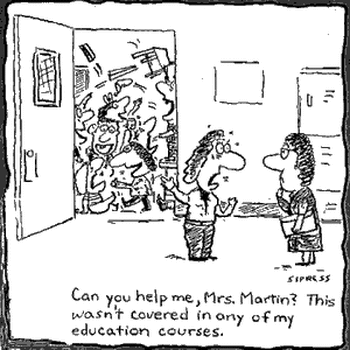 The National Council on Teacher Quality recently released a report stating that teacher training programs don't do enough to prepare new teachers for classroom management. Their report is based upon research of approximately 122 teacher preparation programs across 33 states. Essentially, the report believes that the programs' integrated classroom management curriculum across classes as well as Student Teaching is merely a facade for a lack of direct training. Many years have passed since I was enrolled in the Teacher Credential Program at California State University, Northridge. I don't recall the topic of classroom management being a significant percentage of the curriculum (I would say less than 10%). However, after nearly 20 years of classroom experience, it is definitely something that should be emphasized. A combination of skills and techniques learned from a textbook as well as some practical experience (before student teaching) would equip those soon to be teachers with tools to successfully manage their classrooms. In my opinion, without adequate classroom management skills, teachers (particularly new teachers) will have a difficult time getting through lessons and accomplishing goals each day. The most important thing new teachers need to understand is that every classroom dynamic is unique. It is important to find out what strategies work best for a particular class and stick with it. I feel the following tips are crucial for successful classroom management: 1. On the first day of school, plan to have a discussion regarding behavioral expectations. It is important to have these expectations and rules posted in the classroom where they are easily seen. Your expectations need to start on that first day. Hold all students accountable for their actions, so there is no room for interpretation. 2. On the first day of school, go over all day to day classroom expectations (turning in homework, writing down homework assignments, what to do while other classmates are finishing the morning routine, etc.) 3. Praise students for good behavior as soon as it is recognized.. This can be in the form of a comment or a part of a behavior management program that you have created for your class. 4. Consequences...say what you mean, mean what you say. If you tell a student they will miss recess if they interrupt the lesson, they should miss recess if they interrupt. In other words, follow through. If you allow for second and third chances, students will know that they can test the limits. 5. Engage students(as best you can) with interesting lessons that provide for plenty of opportunities to participate. This can be done by having your students involved in activities that require cooperation within a group as well as moving about the classroom. Create a stimulating environment that student are excited to be a part of each day. 6. Be flexible. If you are in the middle of a lesson you feel is really good but isn't working well (for whatever reason), make some changes on the go. Don't try to force the lesson to work because it will simply frustrate you and the students. 7. Take breaks within lessons or shortly after lessons when transitioning to another lesson or class. You can even stop a lesson 5 minutes early. Students can use this time to stretch, get some water, use the restroom, or just relax for a few minutes. 8. Plan for cooperative activities on different days of the week (if possible). These activities can be fun in addition to reinforcing working within a group. 9. Have class meetings once a week (if your schedule permits). This is a good for the teacher to ask if anyone has anything to share about their school experience for that week. Caution: As the teacher, you must develop a format for these meetings that fosters active listening and respecting the opinions of their classmates. without proper structure, this activity could have a negative effect on your classroom dynamic. 10. Get to know your students. Find a few minutes every now and then to see how each student is feeling. Each year, I used to create a schedule to have lunch once a week with each student. After having lunch one time with each student, the rotation would begin again. This time students were able to invite ONE friend to their scheduled lunch time. I found this to be an excellent way to get to know my students beyond what I would see on a daily basis. In addition, each student was able to learn more about me other than what they witnessed in the formal classroom setting each day.
0 Comments
Leave a Reply. |
AuthorRandy Sally Archives
June 2023
Categories
All
|

 RSS Feed
RSS Feed
